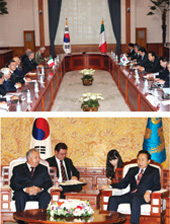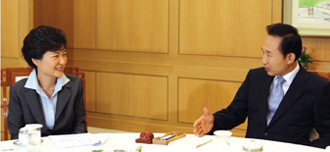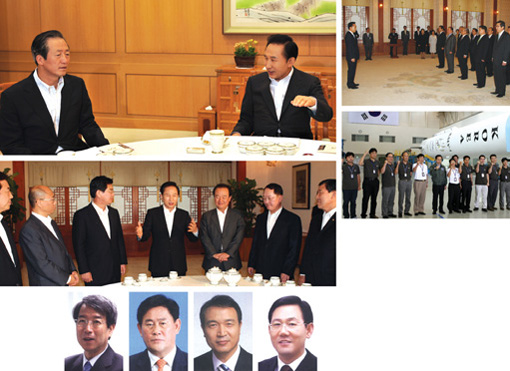President Lee Pursues Centrist Policies Amid Rising Approval Ratings
Replaces Cabinet and senior Cheong Wa Dae aides in second massive reshuffle since his inauguration


President Lee Myung-bak named Chung Un-chan, a progressive economist, ex-Seoul University president and a critic of the government, as the new prime minister. He also replaced five Cabinet ministers and picked a nominee to a newly established position on Sept. 3, the second massive reshuffle since his inauguration.
The announcement of the new Cabinet personnel change followed the reshuffle of senior secretaries to President Lee, conducted on Aug. 31 in what the presidential office, Cheong Wa Dae, was touted as a bid to better cope with the changing external and internal environment and to overhaul systems to help the chief executive carry out state affairs in a more efficient manner.
¡°As one of the leading economists in the nation, the nominee for Prime Minister is well known for his leadership skills that are conducive to social cohesion and for his unmatched capabilities in the international arena. In addition, up until now, he has put forward numerous, constructive policy suggestions for the incumbent administration, which was an important consideration in appointing him as the best man for the job,¡± Chong Wa Dae said.
The reshuffle came as President Lee and Cheong Wa Dae aides were pleased with the results of the latest opinion poll that showed the president¡¯s approval rating climbing back above the 50 percent range, a level he last saw at the time of his inauguration.
Political analysts say President Lee¡¯s selection of Chung as prime minister-designate is construed as an effort to maintain his new centrist polices for social cohesion and enhanced welfare for those in the low-income bracket.
President Lee suffered a setback when his public approval rating plummeted to the 20 percent range at the time of the massive candlelight demonstrations in protest against U.S. beef imports last year and the downward spiraling of the national economy in the wake of the ongoing global financial crisis.
One of the major factors that reversed President Lee¡¯s approval rating to the current 53.8 percent level in the recent public opinion survey conducted by Jam Gil Research was the clear sign of recovery from the year-long global economic crisis. The survey showed that the highest rate by occupation was 59 percent among self-employed businesspeople. It means that a majority of people who were once skeptical of the businessman-turned-president¡¯s handling of state affairs against expectations began to give credit to his policies.
The Korean economy posted the highest level of GDP growth out of all OECD member nations in the second quarter. The Korean economy grew 2.6 percent in the second quarter of 2009, outperforming an earlier estimate of 2.3 percent. July saw the first increase in industrial production in 10 months, following the second quarter¡¯s phenomenal 8.2 percent growth over the first quarter in manufacturing production. Reflecting Korea¡¯s fast recovery pace, the international ratings agency, Fitch, revised Korea¡¯s sovereign rating outlook from ¡°Negative¡± to ¡°Stable.¡±
In an apparent bid to dispel allegations that Lee sides with the rich, the president has maintained a centrist line, as he frequently tours such places as conventional markets to meet merchants and others in the low-income bracket and come up with a series of policies focusing on social integration.
The replacements and new nominee for the Cabinet team are Lee Kwi-nam, former Vice Minister of Justice, as Minister of Justice; Kim Tae-young, Chairman of the Joint Chiefs of Staff, as Minister of National Defense; Choi Kyung-hwan, Grand National Party lawmaker, as Minister of Knowledge Economy; Yim Tae-hee, Grand National Party lawmaker, as Minister of Labor; Paik Hee-young, Professor of the Food and Nutrition Department at Seoul National University, as Minister of Gender Equality; and Joo Ho-young, Grand National Party lawmaker, as Minister for Special Affairs.
The focus in the selection process this time was placed on whether the nominees would be able to fulfill their duties in a substantive manner in line with the governance philosophy of President Lee, which is embodied by measures focusing on the well-being of ordinary citizens in a middle-of-the-road pragmatic way. Notably, three lawmakers were chosen to join the Cabinet. The newly created post of Minister for Special Affairs reflects the strong determination of the administration to facilitate communication and join forces with the ruling party, the presidential office said.
Earlier, President Lee replaced his four top aides in a reshuffle of his secretariat designed to strengthen policy coordination, publicity activities and ties with the National Assembly. In the reshuffle, President Lee established the new post of chief of policy in charge of coordinating economic and social policies and promoted Yoon Jin-shik, senior secretary for economic affairs, to the number two post at Cheong Wa Dae. Kang Man-soo, former minister of strategy and finance and incumbent chairman of the Presidential Council on National Competitiveness, was appointed to be senior adviser for economic affairs.
On the domestic political front, President Lee held a rare 40-minute closed-door one-on-one meeting with Rep. Park Geun-hye, the former chairperson of the ruling Grand National Party and the leader of the party¡¯s major faction on Sept. 15 in what was seen as Lee¡¯s gesture to mend fences with Park. The tte-a-tte followed a dinner with Park and GNP lawmakers, who recently returned from overseas trips as presidential envoys.
It was not known what topics President Lee and Rep. Park, who are not on good terms with each other since a fierce confrontation during the presidential race, discussed during the closed-door meeting. Sources said the two might have touched on such issues as the revision of the Constitution President Lee proposed.
On the diplomatic affairs front, Lee, who has been pursuing pragmatic diplomacy, reportedly expressed hope that Japanese Emperor Akihito will visit Seoul next year in what is seen as a symbolic move to end historic rifts between the two nations.
Expectations are mounting on ushering in a new era of regional cooperation as Japan¡¯s new Prime Minister Yukiho Hatoyama, who recently shook up the government with his left-of-center party after a half century of rule by conservatives, indicated a thaw with Asian neighbors. nw
(clockwise) President Lee Myung-bak holds summit talks with Italian President Giorgio Napolitano at Cheong Wa Dae on Sept. 14.; President Lee has a tete-a-tete with Park Geun-hye, former Grand National Party chairperson , who recently returned from an overseas trip as a presidential envoy at the presidential office on Sept. 16.; and Lee receives a courtesy call from Victor Ivanovich Ishaev, Russia¡¯s presidential representative to the Far Eastern Federal District at his office on Aug. 27. (Photo by Courtesy of the MCST)
(clockwise) President Lee exchanges views with Chung Mong-joon, the new chief of the ruling Grand National Party (GNP) on Sept. 9.; President Lee Myung-bak meets with newly appointed presidential aides at Cheong Wa Dae.; Lee visits the Naro Aerospace Center in Goheung, Jeollanam-do on Aug. 28 as Korea¡¯s first space rocket was launched for a partial success.; and Lee has a meeting with GNP senior policy-making committee officials on Aug. 25. (Photo by Courtesy of the MCST)
Members of the revamped Cabinet include Prime Minister-designate Chung Un-chan,; Choi Kyung-hwan, minister of knowledge economy,; Yim Tae-hee, minister of labor,; and Joo Ho-young, minister for special affairs.
3Fl, 292-47, Shindang 6-dong, Chung-gu, Seoul, Korea 100-456
Tel : 82-2-2235-6114 / Fax : 82-2-2235-0799